
Inquisitor
Across the battlefield, a cowled figure points at the demonic leader of his foes, shouting words of condemnation and judgment. Now, feeling empowered with righteous fury, the figure rushes forward to slay his foe and end its wicked campaign.
A dwarf sniffs the subtle tracks left in the soft loam just hours before. "Aberrations...", she mutters to her companions. Knowing what lies beyond, the dwarven adventurer prepares her tactics and weapons to effectively destroy the monsters ahead.
A tiefling stands by as his companions parlay with a passing bard. The bard seems to be providing helpful information about the surrounding lands and its threats, but suddenly one phrase strikes the tiefling as deceptive. The tiefling touches his companion's shoulder and shakes his head slowly, letting the party know to be on their toes with this liar.
These adventurers are inquisitors, warriors bestowed with divine power to find, reveal, and destroy both monsters and wicked individuals. Grim and determined, the inquisitor roots out these enemies of the faith, using wit and cunning when righteousness and purity are not enough.
Justice Seekers
Inquisitors have a powerful sense of justice and seek to punish those who threaten the innocent or perform other evil deeds. Their intense dedication to bringing justice gives them the ability to cast divine spells tailored to tracking the iniquitous and resisting evil.
These agents of the divine are exceptionally skilled in both combat and knowledge surrounding dangerous beasts and individuals. Using their wit, an inquisitor gathers information as they travel to understand their foe so that they can be ready for whatever lies ahead. Each inquisitor has various means of preparing for specific foes, such as specialized tactics or magical preparations, that they use to gain the upper hand before fighting even begins.
Uproot the Wicked
Although inquisitors are often dedicated to a diety or church, they often act above the normal rules and conventions of that faith. They answer to their deity and their own sense of justice alone, and are willing to take extreme measures to meet their goals.
Inquisitors tend to move from place to place, seeking and following leads on enemies and researching emerging threats. As a result, they often travel with others in adventuring parties, whether to mask their presence or to seek strength in numbers to defeat a particularly dangerous foe. Inquisitors often work with other members of their faith when possible, but no one is above their suspicion and prying eyes.
Creating an Inquisitor
When creating an inquisitor, the most central question to answer is why you have developed such an intense dedication to bringing justice to the wicked. Did something happen to you or a loved one, instilling a personal drive to get revenge on every evildoer in reach? Maybe you have been commanded by a diety to be their agent with a mission to find and slay their enemies through any means available? Perhaps you inherently have a strong sense of right and wrong and cannot abide any amount of corruption?
Also consider the nature of your faith. First decide what diety or faith you belong to. Alternatively, you could act on your own with no connection to a structured church or particular god. Second, consider the relationship between the tenets of your faith and your dedication to dealing out justice. Do you see your faith's beliefs as immutable and absolute, or do you see them as something that comes second to your quest against evil? Perhaps you don't care for your faith's beliefs at all and simply use the resources of your church to further your own goals.
Lastly, consider why you have joined an adventuring party. There are a variety of reasons you may have joined with others. You might be trying to avoid the notice of those looking for a lone operative? Or perhaps you need strength in numbers to take down an exceptionally dangerous target? Maybe you just see your fellow adventurers as competent warriors and find it's easier to accomplish your goals with them at your side?
Quick Build
You can make an inquisitor quickly by following these suggestions. First, make Strength or Dexterity your highest ability score, followed by Wisdom. Second, choose the Acolyte background.









The Inquisitor Table
| Level | Proficiency Bonus |
Features | Judgments | 1st | 2nd | 3rd | 4th | 5th |
|---|---|---|---|---|---|---|---|---|
| 1st | +2 | Judgment, Monster Lore | 2 | ─ | — | — | — | — |
| 2nd | +2 | Fighting Style, Spellcasting | 2 | 2 | — | — | — | — |
| 3rd | +2 | Inquisition, Bane of Evil, Track the Vile | 3 | 3 | ─ | — | — | — |
| 4th | +2 | Ability Score Improvement | 3 | 3 | ─ | — | — | — |
| 5th | +3 | Extra Attack | 3 | 4 | 2 | ─ | — | — |
| 6th | +3 | Counterstrike | 4 | 4 | 2 | ─ | — | — |
| 7th | +3 | Inquisition Feature, Judgment (2 Options) | 4 | 4 | 3 | ─ | ─ | — |
| 8th | +3 | Ability Score Improvement | 4 | 4 | 3 | ─ | ─ | — |
| 9th | +4 | ─ | 4 | 4 | 3 | 2 | ─ | ─ |
| 10th | +4 | Bane Improvement, Expose the Wicked | 4 | 4 | 3 | 2 | ─ | ─ |
| 11th | +4 | Inquisition Feature | 4 | 4 | 3 | 3 | ─ | ─ |
| 12th | +4 | Ability Score Improvement | 5 | 4 | 3 | 3 | ─ | ─ |
| 13th | +5 | ─ | 5 | 4 | 3 | 3 | 1 | ─ |
| 14th | +5 | Stalwart | 5 | 4 | 3 | 3 | 1 | ─ |
| 15th | +5 | Inquisition Feature, Judgment (3 Options) | 5 | 4 | 3 | 3 | 2 | ─ |
| 16th | +5 | Ability Score Improvement | 5 | 4 | 3 | 3 | 2 | ─ |
| 17th | +6 | ─ | 6 | 4 | 3 | 3 | 3 | 1 |
| 18th | +6 | Discern Lies | 6 | 4 | 3 | 3 | 3 | 1 |
| 19th | +6 | Ability Score Improvement | 6 | 4 | 3 | 3 | 3 | 2 |
| 20th | +6 | Final Judgment | 6 | 4 | 3 | 3 | 3 | 2 |
Class Features
As an Inquisitor, you gain the following class features:
Hit Points
- Hit Dice: 1d10 per inquisitor level
- Hit Points at 1st Level: 10 + your Constitution modifier
- Hit Points at Higher Levels: 1d10 (or 6) + your Constitution modifier per inquisitor level after 1st.
Proficiencies
- Armor: Light armor, medium armor, shields
- Weapons: Simple weapons, martial weapons, firearms (if present in your campaign)
- Tools: None
- Saving Throws: Wisdom, Intelligence
- Skills: Choose three skills from History, Insight, Intimidation, Investigation, Perception, Religion, Stealth, Survival
Equipment
You start with the following equipment, in addition to the equipment granted by your background:
- (a) a martial weapon and a shield or (b) two martial weapons
- (a) a hand crossbow or (b) a heavy crossbow
- (a) studded leather or (b) scale mail
- (a) a dungeoneer's pack or (b) a priest's pack
Judgment
Beginning at 1st level, you can declare judgment on your foes either as a loud declaration of condemnation or a quiet resolve to bring justice. As a bonus action, a creature (or creatures) of your choice that you can see. Creatures chosen in this way become your "judged creatures".
Each creature chosen expends one use of judgment. You have a number of uses of judgment shown for your inquisitor level in the Judgments column of the Inquisitor table. You must finish a long rest before you can declare judgment again.
When you declare judgment, choose one of the following options. You gain the benefits of the chosen judgment for one minute, until you declare judgment again, or you are incapacitated or killed. Beginning at 7th level, you may choose up to two judgment options when you declare judgment. Beginning at 15th level, you may choose up to three.
Judgments List
Condemnation. You gain an intense, penetrating focus on your quarry. Judged creatures have a penalty to saving throws to resist your spells equal to your wisdom modifier.
Destruction. You are filled with divine wrath. You gain a bonus to weapon damage rolls equal to your wisdom modifier against judged creatures.
Healing. You are surrounded by a holy light, healing wounds you sustain. When you take damage from judged creatures, the damage you take is reduced by an amount equal to your wisdom modifier.
Justice. Your are spurred to bring justice to the unholy. You gain a bonus to attack rolls against judged creatures equal to half of your wisdom modifier
(rounded up).















Protection. You are enveloped by a protective aura. You gain a bonus to AC equal to half your wisdom modifier (rounded up) against attack rolls from judged creatures.
Purity. You resolve yourself against the foul taint of your foes. You gain a bonus to saving throws against spells and other effects from judged creatures equal to your wisdom modifier.
Smiting. You call upon holy powers to smite the wicked. Choose either acid, cold, fire, lightning, necrotic, poison, or radiant. Your weapon attacks against judged creatures deal that damage type and count as magical.
Monster Lore
Beginning at 1st level, you have a strong intuition for the behaviors of all kinds of abominable creatures, granting you the following benefits:
- You may use your wisdom modifier in place of intelligence for arcana, history, nature, and religion checks made to learn or recall information about a creature's strengths/weaknesses, abilities, tactics, behaviors, etc.
- You may perform one of the above checks as a bonus action on your turn. You have advantage on these checks if the target is currently one of your "judged creatures".
- You automatically know a creature's type when you perform an arcana, history, nature, or religion check about a creature and get a result of 10 or higher, unless that creature is magically disguised.
Fighting Style
At 2nd level, you adopt a particular style of fighting as your specialty. Choose one of the following options.
You can't take a Fighting Style option more than once, even if you later get to choose again.
Archery
You gain a +2 bonus to attack rolls you make with ranged weapons.
Defense
While you are wearing armor, you gain a +1 bonus to AC.
Dueling
When you are wielding a melee weapon in one hand and no
other weapons, you gain a +2 bonus to damage rolls with
that weapon.
Great Weapon Fighting
When you roll a 1 or 2 on a damage die for an attack you
make with a melee weapon that you are wielding with two
hands, you can reroll the die and must use the new roll,
even if the new roll is a 1 or a 2. The weapon must have the
two-handed or versatile property for you to gain this
benefit.
Protection
When a creature you can see attacks a target other than
you that is within 5 feet of you, you can use your reaction to
impose disadvantage on the attack roll. You must be
wielding a shield.
Two-Weapon Fighting
When you engage in two-weapon fighting, you can add
your ability modifier to the damage of the second attack.
Spellcasting
Beginning at 2nd level, your staunch dedication to destroying the wicked and monstrous grants you the ability to produce divine spells.
Preparing and Casting Spells
The Inquisitor table shows how many spell slots you have to cast your spells of 1st level and higher. To cast one of these Inquisitor spells, you must expend a slot of the spell’s level or higher. You regain all expended spell slots when you finish a long rest.
You prepare the list of inquisitor spells that are available for you to cast, choosing from the inquisitor spell list. When you do so, choose a number of inquisitor spells equal to your Wisdom modifier + half your inquisitor level (minimum of 1 spell). The spells must be a level for which you have spell slots.
You can change your list of prepared spells when you finish a long rest. Preparing a new list of inquisitor spells requires time strategizing about the foes ahead and choosing the tools needed to find and defeat them: at least 1 minute per spell level for each spell on your list.
Spellcasting Ability
Wisdom is your spellcasting ability for your inquisitor spells. You use your wisdom whenever a spell refers to your spellcasting ability. In addition, you use your wisdom modifier when setting the saving throw DC for an inquisitor spell you cast and when making an attack roll with one.
Spell attack modifier = your proficiency bonus +
Spellcasting Focus
You can use a holy symbol as a spellcasting focus for your inquisitor spells.
Inquisition
At 3rd level, your tactics for rooting out your foes becomes more specialized. Inquisitors are grouped into various inquisitions based on their skills and strategies for culling threats to their faith. The inquisition you choose grants you features at levels 3, 7, 11, and 15.
Bane of Evil
Beginning at 3rd level, whether through alchemical concoctions, martial strategization, or other means, you prepare yourself to deal with a particular brand of foe in your downtime. When you complete a long or short rest, choose one creature type (e.g. humanoids, monstrosities, elementals, fiends, etc.). Your weapon attacks deal 1d6 extra damage to creatures of that type until your next rest.
At 10th level, you may choose two creature types when you complete a rest, and the extra damage increases to 2d6.












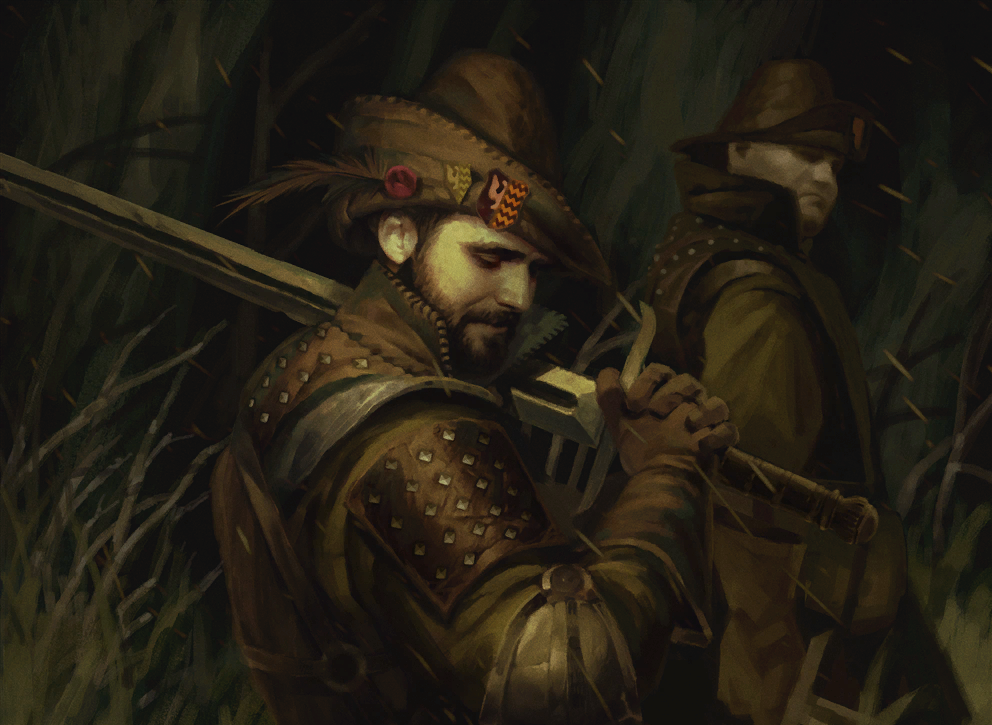









Track the Vile
Beginning at 3rd level, you are particularly adept at finding where your enemies hide. You have advantage on survival and perception checks made to track, follow, or find creatures as well as to identify a creature from tracks or other clues.
Ability Score Improvement
When you reach 4th level, and again at 8th, 12th, 16th, and 19th level, you can increase one ability score of your choice by 2, or you can increase two ability scores of your choice by 1. As normal, you can’t increase an ability score above 20 using this feature.
Using the optional feats rule, you can forgo taking this feature to take a feat of your choice instead.
Extra Attack
Beginning at 5th level, you can attack twice, instead of once, whenever you take the attack action on your turn.
Counterstrike
Beginning at 6th level, you gain a supernatural sense for your foe's next move. When a judged creature hits you with an attack, you may use your reaction to add 1d6 to your AC for that attack. If this causes the attack to miss, you may make one weapon attack against the triggering creature as part of your reaction.
Expose the Wicked
Beginning at 10th level, you can magically deduce the intentions and desires of creatures around you.
- You always have the spell detect good and evil prepared, which does not count against your number of Inquisitor spells prepared.
- When you cast detect good and evil, its area extends to 60 feet and you learn the alignment of all detected creatures in the area.
Stalwart
Beginning at 14th level, you steel yourself in both body and mind against the assaults of the unrighteous, granting you the following benefits:
- You gain proficiency in constitution saving throws.
- You make wisdom saving throws with advantage.
Discern Lies
Beginning at 18th level, untruths and deceptions ring dissonant in your ears. While you can hear or see a creature, you automatically know if that creature tells a lie or half-truth, or otherwise tries to deceive with language or gestures. You do not necessarily learn what is actually true, but you do know that what was expressed is untrue or misleading from the perspective of that creature.
Final Judgment
Beginning at 20th level, you are able to declare final judgment on the most vile foes. Once per long rest, when you declare judgment, you may select one of your "judged creatures" to undergo final judgment.
In the next minute, when you first hit that creature with a weapon attack, they must make a constitution saving throw against your spell save DC. On a failed save, that creature immediately dies and can only be returned to life by means of a true resurrection or wish spell. On a success, that creature is immune to the effects of final judgment for 24 hours.
Inquisitions
While all inquisitors are dedicated to uprooting and destroying the foes of their ideals and faith, there are many strategies and approaches they take in doing so. These approaches are grouped into inquisitions, granting particular capabilities and specialties to its member inquisitors.
Crusader
Crusaders eschew the intrigue and cautious approaches of their fellows to, instead, meet their foes head on. Donning heavy armor and powerful arms, crusaders fight on the front line against evil to protect the innocent. Crusaders believe the best way to stem the flow of evil in the world is to be a stubbornly obvious opponent to its agents. Working in the shadows just gives your foes more room to maneuver.
Heavy Armor
At 3rd level, when you choose this inquisition, you gain proficiency in heavy armor.
Trial by Combat
Beginning at 3rd level, you call your foes to meet you in honorable combat. You gain the following judgment option:
Trial by Combat. Your foes are compelled by your presence to target you. Judged creatures have disadvantage on
attack rolls against creatures other than you. Similarly,
you have disadvantage on attack rolls against creatures
other than the judged creatures.
Bolstering Presence
Beginning at 7th level, you can perform inspiring deeds of bravery to bolster your allies' confidence. Once per long rest, when you hit a hostile creature with a weapon attack, you may choose to give all creatures of your choice that can see you (including yourself) temporary hit points equal to your inquisitor level plus your wisdom modifier.
Fearless Champion
At 11th level, you become invulnerable to a fear of evil and danger. You gain immunity to the frightened condition.
Masterful Combatant
Beginning at 15th level, you are exceptionally skilled at defeating your foes in honorable combat. You have advantage on attack rolls against creatures affected by your
Trial by Combat judgment.









Witch Hunter
Some inquisitors focus their concern on the abundant magical threats in the world. They loathe the use of magic for nefarious purposes, which they see as supremely evil and a desecration of what should be a holy art. These inquisitors, known as witch hunters, scour the lands to reveal and destroy necromancers, witches, and all kinds of vile casters.
Arcane Emphasis
At 3rd level, you refine your practice of the arcane in order to better counter those who would use it for evil. You gain proficiency in arcana (or another inquisitor class skill if already proficient), and you learn two cantrips of your choice from the wizard spell list.
In addition, when you learn an inquisitor spell, you can choose the new spell from the wizard spell list or the inquisitor spell list. These are inquisitor spells for you.
Rebuke Witchcraft
At 3rd level, you learn to quench impure magics. You gain the following judgment option:
Rebuke Witchcraft. You condemn the unholy use of magic amongst your foes. When a judged creature attempts to cast a spell, they must first make a wisdom saving throw against your spell save DC. On a failed save, the creature must take a different action and cannot cast spells until the beginning of their next turn. On a success, this judgment effect ends for that creature.
Sanctity of Magic
At 7th level, you learn to resist the influence and effects of vile magic. You have advantage on saving throws to resist spells and magical effects from judged creatures.
Witch Trial
Beginning at 11th level, you can magically detect the presence of those with a command over magic. You gain the following benefits:
- You always have the spell detect magic prepared, which does not count against your number of Inquisitor spells prepared.
- When you cast detect magic, its area extends to 60 feet and the spell additionally reveals a magic aura around anyone with the ability to cast at least one spell. You learn the source of magic for any creature revealed in this way, which could be their spellcasting class, their race, etc.
Suppress Magic
Beginning at 15th level, you are able to suppress the
weave of magic around creatures either to protect them
against harmful magics or to prevent them from casting
spells. Once per long rest, as an action, you can create a
personal antimagic field around a creature of your choice
within 30 feet (including yourself). The field lasts for up to
1 minute, requiring your concentration to maintain.
This field functions identically to the one created by
the spell antimagic field except that it only affects a
single creature instead of an area. Specifically, a creature
affected by this field cannot be affected by magic,
objects they are wielding or wearing become
nonmagical, and they cannot cast spells.
An unwilling target of this antimagic field can make a
saving throw using their spellcasting ability against
your spell save DC (e.g. a wizard would make an
intelligence saving throw). If a creature has multiple
spellcasting ability scores, they choose which to use for
the saving throw. On a successful save, the field does not
form, that creature is immune to this field for 24
hours, and your use of suppress magic is not
expended.


















Slayer
While all inquisitors seek to root out and destroy evil, none are more dedicated to the art than slayers. Members of this inquisition specialize in destroying a particular type of enemy and become exceptionally skilled at understanding and countering those particular foes. However, with the correct preparation, slayers can be an immense threat to any creature they set their sights on.
Specialized Adversary
At 3rd level, you devote considerable effort towards understanding one type of creature so that you can better rid the world of their foul presence. Choose any creature type, such as aberration or undead to become your specialized adversary. You always deal bane damage to creatures of that type.
In addition, you gain proficiency in arcana, history, nature, or religion checks (your choice). Your selection should be based on your selection of specialized adversary (e.g. if your specialized adversaries are undead or fiends, you might choose religion). If you are already proficient in your first choice, you may choose one of the other skills.
Monster's Bane
Beginning at 3rd level, you are especially dedicated to destroying foul creatures. You gain the following judgment option:
Monster's Bane. You deftly target the weaknesses of
your foes. When you deal bane damage to a judged
creature, the size of the extra damage
die/dice increases from a d6 to a d12.
Adept Counter
Beginning at 7th level, you are always prepared to punish the mistakes and openings of your specialized adversaries. When a creature belonging to your specialized adversary type misses an attack roll against any target, you may use your reaction to make a weapon attack against the triggering creature.
Prepared Hunter
Beginning at 11th level, you are an expert in knowledge regarding your specialized adversary, granting you the following benefits:
- You are considered proficient whenever making an arcana, history, nature, or religion check about your specialized adversary.
- You add double your proficiency bonus to any of the above checks when they are about your specialized adversary.
Exploit Weakness
Beginning at 15th level, you learn to exploit the weaknesses of creatures you are prepared to fight, entirely removing their ability to fight back. Once per round, when you deal bane damage to a creature, you can force that creature to make a constitution saving throw against your spell save DC. On a failed save, that creature is stunned until the
end of your next turn.
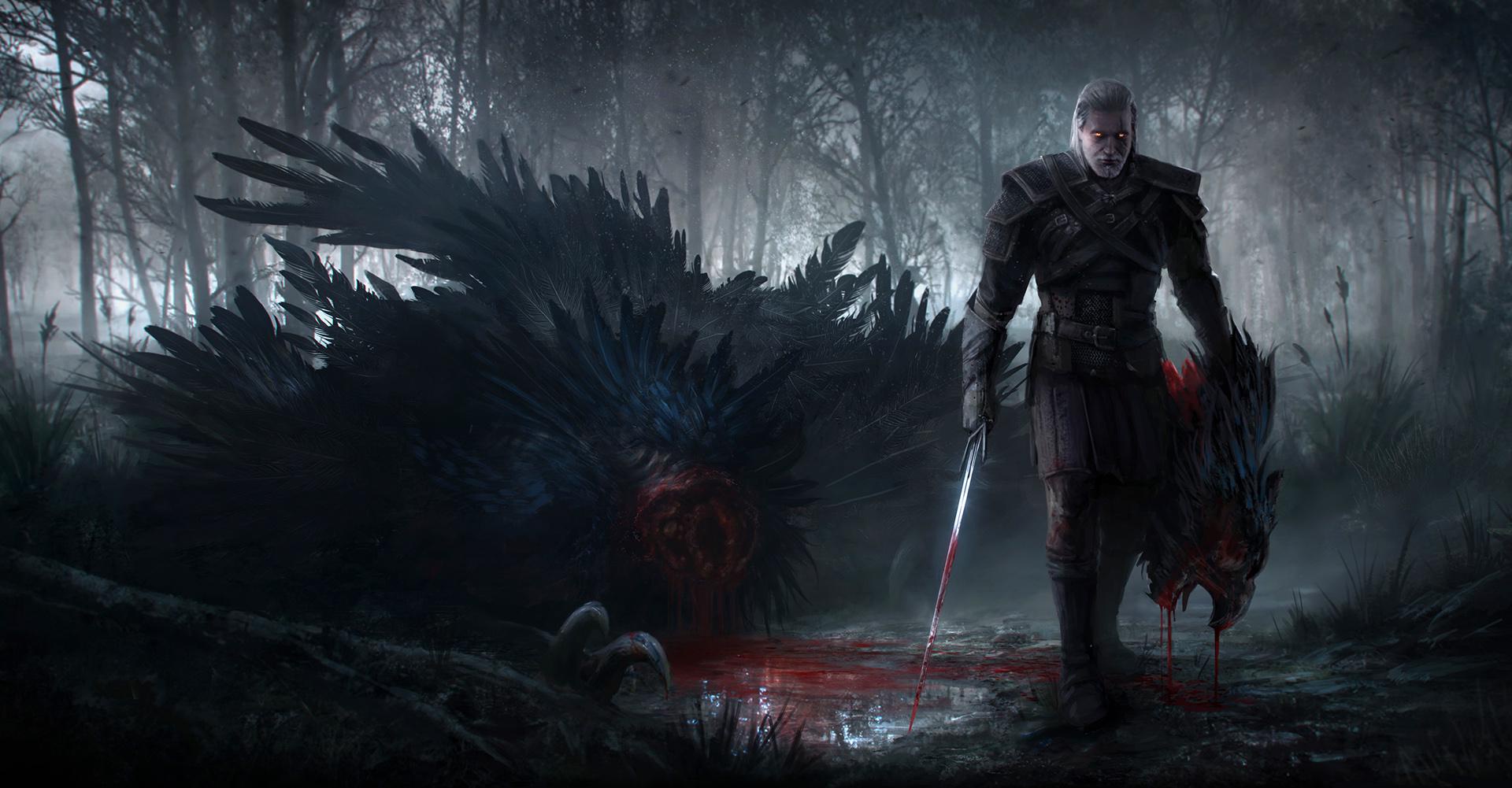








Justicar
Many churches, cults, and religious states utilize agents to enforce their will. These agents are justicars, sent out with the mission to punish transgressors and keep people in line with the laws of the land or tenents of the faith. The brutality and liberal application of punishment common to justicars has earned them a frightening reputation oft spoken in hushed tones for fear of being heard.
Stern Visage
Beginning at 3rd level, your stern and intimidating presence unnerves the feeble hearted and guilty. You gain proficiency in intimidation (or another inquisitor skill if already proficient).
In addition, you may use your wisdom modifier in place of charisma for intimidation checks.
Punish Transgression
Beginning at 3rd level, you empower yourself to punish the sins and crimes of the iniquitous. You gain the following judgment option:
Punish Transgression. When judged creatures deal damage, you add half the damage dealt (rounded down) to a "punishment" value. When you next hit a judged creature with a weapon attack, you deal extra damage equal to the current punishment value, which is then reset to 0.
Punishment has a maximum value equal to your
inquisitor level plus your wisdom modifier. Its
value is reset to 0 when the judgment effect
ends.
Make an Example
Beginning at 7th level, your brutal punishments strike fear into transgressors. Once per short or long rest, when you deal extra damage with the punish transgression judgment, you can cause all hostile creatures within 30 feet of your target to make a wisdom saving throw against your spell save DC. On a failed save, a creature is frightened and may repeat the saving throw at the end of each of its turns, ending the effect on a success.
Brutal Tactics
At 11th level, you develop brutal strategies to harm your foes as efficiently as possible. Your weapon attacks score a critical hit on a roll of 19 or 20.
Execution
Beginning at 15th level, your attacks are empowered by your calling as justicar to execute the wicked. When you score a critical hit against a judged creature, you additionally deal necrotic damage equal to your inquisitor level
plus two times your wisdom
modifier.
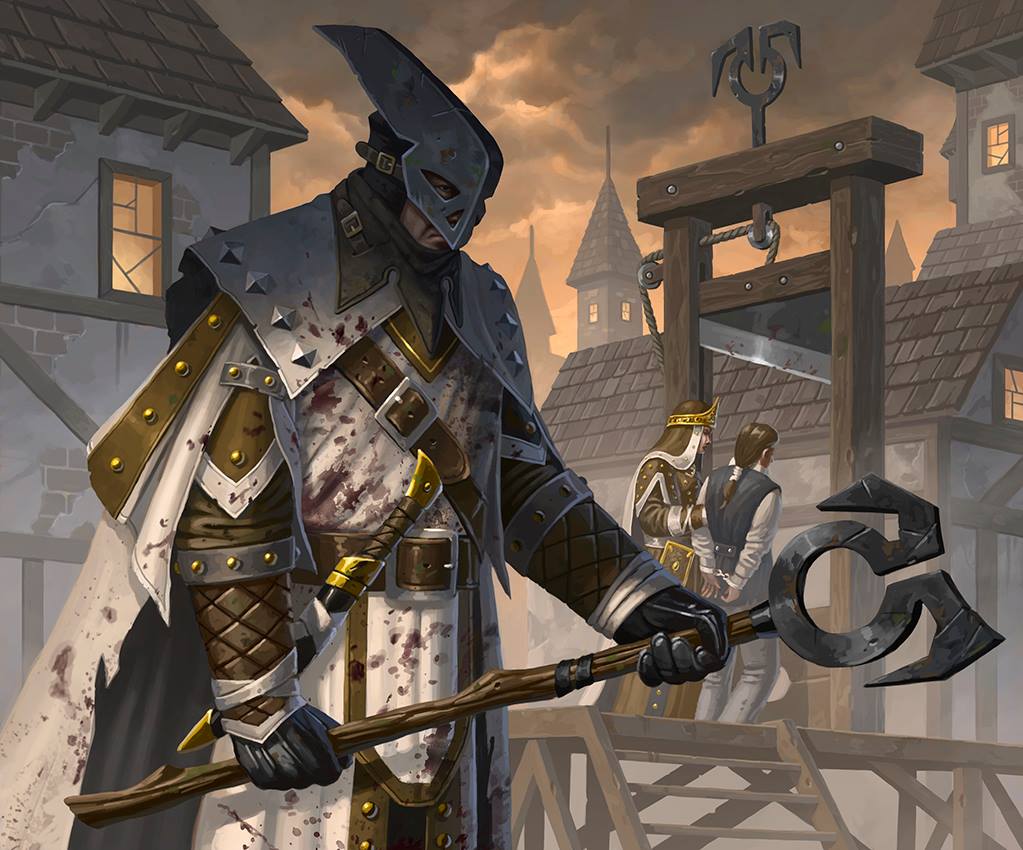











Preacher
Do not let the name fool you: a preacher inquisitor is no simple congregational speaker or soapbox orator. These inquisitors are just as deadly as any other. However, what differentiates a preacher is their desire to convert rather than slay their foes.
Persuasive Orator
Beginning at 3rd level, you are trained in public oration to bring your faith to others. You gain proficiency in persuasion (or another inquisitor class skill if already proficient).
In addition, you may use your wisdom modifier in place of
charisma for persuasion checks.
Conversion
Beginning at 3rd level, you take every opportunity to convince your foes of the might of your faith. You gain the following judgment option:
Conversion. Once per round on your turn, you may replace an attack with an attempt to sway your judged creature to yield. When you do so, the target makes a wisdom saving throw against your spell save DC. On a failed save, you deal nonlethal psychic damage equal to 2d6 plus your wisdom modifier. A judged creature that cannot understand you automatically succeeds on the saving throw.
If this damage reduces your target to a number of hit points equal to or less than your inquisitor level, the creature is charmed and stops fighting you and your allies. If you or an ally damage the charmed creature, the effect ends and they may continue fighting.
Charming a foe in this manner does not typically mean the target is converted to your faith. Generally, at your DM's discretion, the creature is convinced of your power and the power of your god and is surrendering to avoid their wrath.
Invigorating Sermon
Beginning at 7th level, when you complete a long or short
rest, you may choose to deliver a rousing sermon to your
allies. Creatures of your choice that listen to the sermon
gain a number of temporary hit points equal to your
inquisitor level plus your wisdom modifier. In
addition, these creatures have advantage on the next
saving throw they make before their next rest.
Foundation of Faith
Beginning at 11th level, you are unfalteringly confident
in the tenets of your faith. You gain proficiency in and
have advantage on charisma saving throws.
Words of Mercy
Beginning at 15th level, your utterances are laced with
merciful healing power. When you use the conversion
judgment to attempt to sway a creature, you may use
your bonus action to choose up to six creatures
within 60 feet. Those creatures regain hit points
equal to 1d4 plus your wisdom modifier. You may
do this a number of times equal to your
wisdom modifier between long rests.














Sanctified Assassin
Some inquisitors are bestowed with the sensitive task of silencing enemies to their faith or state. These inquisitors are sanctified assassins, killers given the blessing of their god or ruler to skillfully end apocryphal leaders and heretics.
It is of utmost importance that these assassins do not attract unwanted attention to their deeds, so each is specially trained in deception and stealth to ensure their kills can not be traced back to their organization.
Covert Agent
Beginning at 3rd level, you have practiced tactics for getting to your target, whether it be through silver-tongued trickery or soft-footed stealth. You gain proficiency in disguise kits and either stealth or deception (your choice). You may gain proficiency in another inquisitor skill if you are already proficient in both.
Assassinate Heretic
Beginning at 3rd level, you learn to make deadly attacks by catching your foes off guard. You gain the following judgment option:
Assassinate Heretic. Once per turn, when you have advantage on an attack roll against a judged creature, or when another enemy of the judged creature is within 5 feet
of it, your attack deals Xd6 extra damage, where X is
equal to your wisdom
modifier.
Backup Plan
At 7th level, you learn to cut and run when plans go awry to avoid bringing unwanted attention to your faith or church. On your turn, you can hide, disengage, or dash as a bonus action.
Infiltrator
Beginning at 11th level, your skill in the covert arts makes you very difficult to discover. Choose either deception or stealth (you must be proficient in the chosen skill). Your proficiency bonus is doubled for any ability check that uses the chosen skill.
End the Apostate
Beginning at 15th level, you are a master of assassinating unwary foes. When you hit a surprised creature under the effect of the assassinate heretic judgment, it must make a Constitution saving throw against your spell save DC. On a failed save, double the damage of your attack against
the creature.













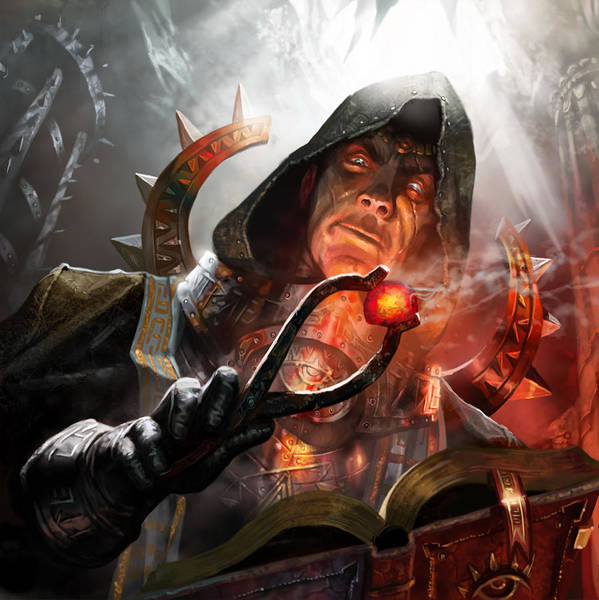









Relic Keeper
Many religious groups put a lot of importance into various holy relics and artifacts. Some inquisitors take it upon themselves to find or protect these objects so that they can be used for righteous purposes.
Religious Historian
Beginning at 3rd level, to better care for holy artifacts, you have familiarized yourself with relevant historical contexts and some of the tools required to maintain/restore those artifacts. You gain proficiency in history (or another inquisitor class skill if already proficient) and a set of artisan's tools of your choice.
Holy Relic
Beginning at 3rd level, you have found or are entrusted with a holy artifact of great power. Choose the nature of your artifact including what type of object it is and what school of magic the artifact is connected to from the following table.
At the end of the subclass is a section of "Relic Powers" listing the magic schools and the relic effects associated with each. While you have the relic on you, you gain the base power corresponding to the chosen school of magic. Your relic does not require attunement, and other creatures cannot use your relic's powers.
| School of Magic | Typical Items |
|---|---|
| Abjuration | Amulets, Armor, Bells, Bracers, Brooches, Cloaks, Holy Symbols, Shields |
| Conjuration | Bags, Bowls, Braziers, Compasses, Figurines, Lanterns, Mirrors |
| Divination | Book, Crystal Ball, Goggles, Decks of Cards, Headbands, Lenses, Planchettes |
| Enchantment | Censers, Crowns, Helms, Musical Instruments, Necklaces |
| Evocation | Gloves, Rods, Staves, Wands, Weapons |
| Illusion | Crystals, Hats, Masks, Prisms, Rings |
| Necromancy | Bones, Coins, Dolls, Drums, Robes, Skulls |
| Transmutation | Belts, Boots, Sandals, Vests, Weapons |
Ancient Power
Beginning at 7th level, you have unlocked greater
power from your relic. Choose one of the focus powers
corresponding to the chosen school of magic for your
relic. You gain the benefits of that focus power while
you have your relic on you.
Relic Appraisal
Beginning at 11th level, you are an expert in appraising the qualities of magical artifacts, granting you the following benefits:
- You always have the spell identify prepared which does not count against the number of spells you can prepare. You can cast identify as a ritual.
- You can cast the spell legend lore once per long rest as a ritual without having the spell prepared. Once you have access to 5th level spell slots, you always have legend lore prepared which does not count against the number of spells you can prepare.
- You have advantage on skill checks to determine the history or properties of an item.
Unleashed Power
By 15th level, you have developed a deep personal connection to your artifact, allowing you to unleash unique magics from the artifact that it had not previously displayed. Choose a second school of magic for your artifact, gaining the benefits of that school's base power, as well as a new focus power from either the original or new school.
Relic Powers
Each holy relic is associated with one of the following schools of magic, granting it particular powers that it can bestow on you.
Abjuration
Abjuration relics are associated with protection and wards.
Protection. The relic has a protective influence. You gain a +1 bonus to saving throws.
Aegis. As an action you can touch a set of armor or a shield and grant it a +1 bonus. This bonus lasts until you enchant another item in this manner.
Antimagic. Whenever you complete a rest, you have advantage on the next saving throw you make to resist a spell or magical effect.
Resistance. Once per short or long rest, when you or a creature within 15 feet takes damage, you can use your reaction to grant that creature resistance to the triggering damage type (including the current damage) until the end of their next turn. You can do this a number of times equal to your wisdom modifier between long rests.
Abjuration Magic. Choose an abjuration spell up to 2nd level from any spell list. At 7th, 11th, and 15th level, choose an additional abjuration spell up to 3rd, 4th, and 5th levels, respectively. Once per long rest, you can cast one of the chosen spells at its base level without expending a spell slot.
Conjuration
Conjuration relics are associated with transporting and summoning creatures.
Conjure. The relic calls otherworldly creatures to your side. Once per long rest, you can use your action to summon a creature with a CR equal to or less than one quarter of your inquisitor level (rounded down). This creature is loyal to you and your allies, helps you to the best of its capabilities without requiring commands, and takes its turn immediately following yours. The creature remains with you for up to 1 hour, requiring your concentration, after which point it returns to its home plane.
Your DM determines an appropriate creature based on the nature of the artifact and has the stats for that creature. In the absence of appropriate creatures, work with your DM to reflavor another creature's statistics to create a relevant creature of appropriate strength.
Disrupt Outsider. When a creature from another plane makes a melee attack roll against you, you can use your reaction to give the roll disadvantage.
Holding. Your artifact functions as a bag of holding.
Shift. Once per round, as a bonus action, you can teleport up to 15 feet. You may do this a number of times equal to your wisdom modifier between long rests.
Conjuration Magic. Choose a conjuration spell up to 2nd level from any spell list. At 7th, 11th, and 15th level, choose an additional conjuration spell up to 3rd, 4th, and 5th levels, respectively. Once per long rest, you can cast one of the chosen spells at its base level without expending a spell slot.
Divination
Divination relics are associated with foresight and knowledge.
Third Eye. The relic grants you improved perceptive capabilities. You have advantage on perception and insight checks.
Epiphany. Once per short or long rest, you can cast the augury spell as a bonus action without material components or expending a spell slot. It only takes the duration of your bonus action to ask your question and receive an answer from the spell.
Foreknowledge. You can use your bonus action to give yourself advantage on your next attack or disadvantage to the next attack that targets you. You can do this a number of times equal to your wisdom modifier between long rests.
True Senses. You gain darkvision to a range of 60 feet, or increase the range of your darkvision by 30 feet. At 11th level, you gain blindsight to a range of 15 feet. At 15th level, your blindsight becomes true sight.
Divination Magic. Choose a conjuration spell up to 2nd level from any spell list. At 7th, 11th, and 15th level, choose an additional conjuration spell up to 3rd, 4th, and 5th levels, respectively. Once per long rest, you can cast one of the chosen spells at its base level without expending a spell slot.
Enchantment
Enchantment relics are associated with mental manipulation and magical influence.
Muddy Mind. The relic subtly befuddles your enemies' minds inhibiting their ability to resist your magic. Your spell save DC increases by 1.
Disorient. When a creature within 30 feet targets you with an attack, you can use your reaction to divert the attack. The triggering creature must make a wisdom saving throw against your spell save DC. On a failed save, it targets the creature that is closest to it, not including you or itself. If there are no other valid targets, the creature targets you.
Hypnosis. You can use your action to target a creature that can see or hear you within 10 feet. That creature must make a wisdom saving throw against your spell save DC or be charmed until the end of your next turn. The charmed creature's speed drops to 0 and is incapacitated.
Psychic Retort. When a creature within 15 feet deals damage to you, that creature takes 1d6 psychic damage. At 11th and 15th level, the die increases to 1d8 and 1d10, respectively.
Enchantment Magic. Choose an enchantment spell up to 2nd level from any spell list. At 7th, 11th, and 15th level, choose an additional enchantment spell up to 3rd, 4th, and 5th levels, respectively. Once per long rest, you can cast one of the chosen spells at its base level without expending a spell slot.
Evocation
Evocation relics are associated with energy, healing, and destruction.
Destructive Energy. The relic lends magical energies to your attacks. You gain a +2 bonus to damage rolls and your weapon attacks count as magical.
Healing. When you or a creature within 15 feet takes damage, you can use your reaction to heal that creature for an amount equal to your inquisitor level plus your wisdom modifier. You can do this a number of times equal to your wisdom modifier between long rests.
Force Barricade. Once per short or long rest, as an action, you can summon a wall of force made of one 5-foot-by-5-foot panel. This wall functions the same as one created by the wall of force spell except for its size. This wall gives you total cover while interposed between you and an enemy. At your DM's discretion, certain enemies may be able to attack around the wall (e.g. an adjacent giant could generally attack over a vertical wall).
Smiting Attacks. Choose acid, cold, fire or lightning when you gain this artifact power. When you hit with a weapon attack, you can choose to deal an extra 1d4 damage of the chosen type with the attack. At 11th and 15th level, the die increases to 1d6 and 1d8, respectively.
Evocation Magic. Choose an evocation spell up to 2nd level from any spell list. At 7th, 11th, and 15th level, choose an additional evocation spell up to 3rd, 4th, and 5th levels, respectively. Once per long rest, you can cast one of the chosen spells at its base level without expending a spell slot.
Illusion
Illusion relics are associated with sensory distortion and stealth.
Distortion. The relic distorts your form and location, making you harder to spot. You gain a +1 bonus to AC and stealth checks.
Double. Once per short or long rest, when you are the target of an attack, you may use your reaction to create an illusory double. The triggering attack automatically misses, hitting your double instead.
Rapid Disguise. You can cast disguise self as a bonus action without expending a spell slot. You can do this a number of times equal to your wisdom modifier and regain expended uses after completing a long rest.
Shifting Illusion. While concentrating on an illusion spell, you can use your bonus action to alter the illusion. Any changes to the illusion must stay within the original limitations of the spell. For example, the minor illusion cantrip cannot be altered to affect an area larger than a 5-ft cube.
Illusion Magic. Choose an illusion spell up to 2nd level from any spell list. At 7th, 11th, and 15th level, choose an additional illusion spell up to 3rd, 4th, and 5th levels, respectively. Once per long rest, you can cast one of the chosen spells at its base level without expending a spell slot.
Necromancy
Necromancy relics are associated with the undead and restoring creatures to life.
Animate. The relic can temporarily animate a recently dead creature. Once per long rest, you may use your action to reanimate the body of a creature that has died within the last 24 hours. The creature retains the statistics it had in life, except its intelligence, wisdom, and charisma scores which are now equal to its original scores or 4 (whichever is lower). In addition, the creature has current hit points equal to half of its maximum hit points at the time of reanimation. The creature remains animated for up to 1 minute, requiring your concentration, after which point it is no longer animated.
The animated creature does not have the capability to make complex decisions, speak, or provide information. The creature takes its turn immediately following yours, but does not act unless you mentally command it (no action required). It is only capable of performing simple tasks such as approaching or attacking a creature, following you, etc. In addition, the creature can use abilities natural to it (e.g. an animated dragon could perform its breath attack), but it is incapable of more complicated actions such as casting spells.
Fear of the Grave. Once per long rest, as an action, you can cause all creatures of your choice within 60 feet to make a wisdom saving throw against your spell save DC. On a failed save, a creature is frightened for 1 minute.
Vampiric Strike. Once per short or long rest, when you hit a creature with a weapon attack, you may choose to grant yourself temporary hit points equal to the damage dealt.
Resist Death. Creatures of your choice within a 10-foot radius have advantage on death saving throws. After granting advantage to three death saving throws, this power ceases until the following dawn, when the artifact recharges.
Necromancy Magic. Choose a necromancy spell up to 2nd level from any spell list. At 7th, 11th, and 15th level, choose an additional necromancy spell up to 3rd, 4th, and 5th levels, respectively. Once per long rest, you can cast one of the chosen spells at its base level without expending a spell slot.
Transmutation
Transmutation relics are associated with altering physical forms.
Empower. The relic strengthens your physical form. Choose either strength or dexterity. You gain a +1 bonus to attack rolls using that ability score.
Harden Skin. Once per long rest, as an action, choose a creature within 30 feet (including yourself). For the next hour, that creature's AC becomes 10 plus its dexterity modifier and your wisdom modifier if it's AC was originally lower. Otherwise, it remains unchanged.
Mutable Form. As an action, you can give yourself an additional speed from the following options dependent on your inquisitor level. Beginning at 7th level, you can grant yourself a swim speed equal to your base speed or a climb speed equal to half your base speed. At 11th level, you can grant yourself a flying speed equal to your base speed. At 15th level, you can grant yourself a burrow speed equal to half your base speed.
Sedate. Once per short or long rest, as a bonus action, you can imbue a weapon you are holding with slowing energy. The next time you hit a creature with an attack with this weapon, that creature is under the effect of the slow spell for up to 1 minute. At the end of each of its turns, a creature can attempt a wisdom saving throw against your spell save DC, ending the effect early on a success.
Transmutation Magic. Choose a transmutation spell up to 2nd level from any spell list. At 7th, 11th, and 15th level, choose an additional transmutation spell up to 3rd, 4th, and 5th levels, respectively. Once per long rest, you can cast one of the chosen spells at its base level without
expending a spell slot.









Inquisitor Spell List
1st Level
- Alarm
- Bane
- Cause Fear
- Charm Person
- Command
- Compelled Duel
- Comprehend Languages
- Cure Wounds
- Detect Evil and Good
- Detect Magic
- Detect Poison and Disease
- Disguise Self
- Divine Favor
- Expeditious Retreat
- Heroism
- Identify
- Illusory Script
- Protection from Evil and Good
- Purify Food and Drink
- Sanctuary
- Shield of Faith
- Sleep
- Zephyr Strike
2nd Level
- Aid
- Arcane Lock
- Augury
- Calm Emotions
- Darkness
- Darkvision
- Detect Thoughts
- Find Traps
- Hold Person
- Knock
- Lesser Restoration
- Locate Object
- Magic Weapon
- Mind Spike
- Mirror Image
- Pass without Trace
- Protection from Poison
- See Invisibility
- Suggestion
- Zone of Truth
3rd Level
- Beacon of Hope
- Clairvoyance
- Counterspell
- Create Food and Water
- Crusader's Mantle
- Daylight
- Dispel Magic
- Elemental Weapon
- Fast Friends
- Fear
- Magic Circle
- Nondetection
- Remove Curse
- Revivify
- Sending
- Tiny Hut
- Tongues
4th Level
- Arcane Eye
- Aura of Life
- Aura of Purity
- Banishment
- Compulsion
- Confusion
- Death Ward
- Divination
- Elemental Bane
- Locate Creature
- Private Sanctum
- Raulothim's Psychic Lance
- Resilient Sphere
- Secret Chest
5th Level
- Circle of Power
- Commune
- Dawn
- Destructive Wave
- Dispel Evil and Good
- Dominate Person
- Geas
- Greater Restoration
- Hallow
- Hold Monster
- Holy Weapon
- Legend Lore
- Mass Cure Wounds
- Modify Memory
- Scrying
- Steel Wind Strike
- Telepathic Bond
Multiclassing
Prerequisites. To qualify for multiclassing with the Inquisitor class, you must meet these prerequisites: 13 Wisdom and 13 Strength or Dexterity.
Proficiencies. When you multiclass into the Inquisitor class, you gain the following proficiencies: Simple weapons, martial weapons, light armor, medium armor, shields.
Spell Slots. You add half your Inquisitor
levels (rounded down) to determine
multiclass spell slots.














The Inquisitor
A halfcaster class for those who really don't like evil. Seek out and destroy the wicked with seven inquisitions: the Crusader, Witch Hunter, Slayer, Justicar, Preacher, Sanctified Assassin,
and Relic Keeper.
Art Credits:
Page 2: Stormfall Guy-1 by Ihor Sapehyn
Page 4: Yael by Astri Lohne
Page 5: Watch Inspector by Mitchell Malloy
Page 6: Witch Hunter by CDProjektRed
Page 7: Teutonic Knight by Catalin Lartist
Page 8: Outlaw Sorcerer by theDURRRRIAN
Page 9: The Witcher by JonasDeRo
Page 10: Extricator of Sin by Craig Spearing
Page 11: Eldar Seer by Timo Kujansuu
Page 12: Gemsoul Deathblade by F. Setiawan
Page 13: Zealous Inquisitor by Ryan Barger
Page 15: Hope Against Hope by David Seguin
Page 16: Warren Black by jamestheboyyy
Page 17: Eonnan Inquisitor by ConceptartistJR
See Dragonshard's GM Binder profile for more homebrew classes inspired by Pathfinder.